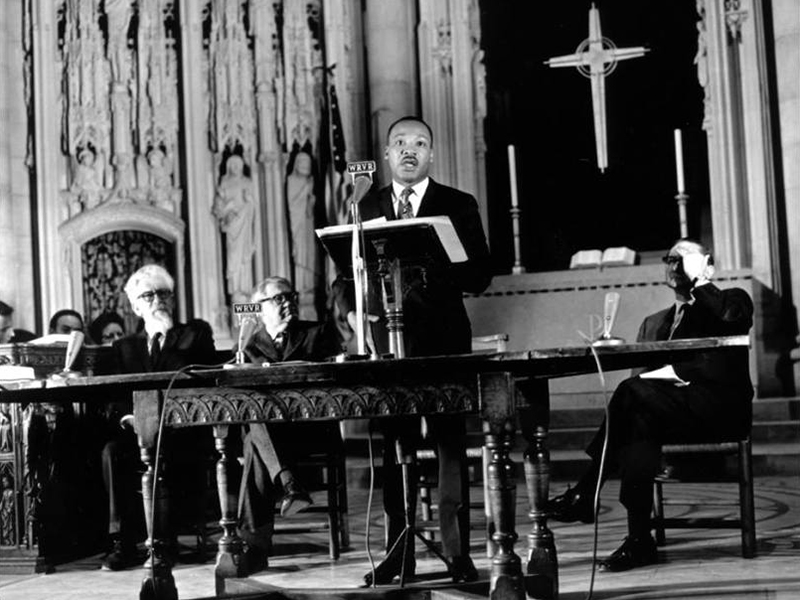
The following is one of a series of commentaries Religion News Service is running by current pastors of churches where the Rev. Martin Luther King Jr. gave major speeches before his assassination 50 years ago.
NEW YORK (RNS) — “The calling to speak is often a vocation of agony, but we must speak.”
These are the words the Rev. Martin Luther King Jr. chose to open one of his most controversial speeches, delivered from the nave of The Riverside Church on April 4, 1967 — one year to the day before his assassination.
In “Beyond Vietnam: A Time to Break Silence,” King reminded his listeners of why he began the work for which he would ultimately give his life. He did not choose to speak for prestige or to tell people what they wanted to hear. He chose to speak because the gospel of Jesus Christ and his conscience would not allow him to remain silent.
Ten years after he became the reluctant voice of the Montgomery bus boycott, five years after he eulogized four innocent girls killed in church and stood over the nation’s capital to proclaim his dream, three years after he marched from Selma, King still believed his work wasn’t complete.
The civil rights movement had won from an indisposed president and unwilling Congress the Civil Rights Act and the Voting Rights Act. Lunch counters and buses and schools across the country were being desegregated and still King was pulled by a calling to speak.
Many of King’s closest advisers warned him against coming out against the Vietnam War. The objections were varied: that he was diluting the civil rights message; that he shouldn’t be talking about foreign policy; that the war was too controversial; that Vietnam had nothing to do with voting rights.
In response, King offered the reminder that the war was being disproportionately fought by America’s black and brown boys, who lacked the means of many of their white contemporaries to avoid the draft. But then he pressed deeper, and in “Beyond Vietnam,” King argued that the war was in reality a symptom of three sins corrupting the soul of America — racism, materialism and militarism. As a preacher of the gospel of Jesus Christ, King could not remain silent because naming these evils was inconvenient to his cause.
The criticism of the speech was swift and sharp. Newspaper headlines read: “A Tragedy,” “Dr. King’s Error,” “Martin Luther King Crosses the Line,” “King Loses Position in Rights Movement,” “Dr. King’s Disservice to His Cause,” “Martin Luther King’s Tragic Decision.”
President Johnson made King persona non grata at the White House. Donations to his organization, the Southern Christian Leadership Conference, all but dried up. The Democratic Party almost en masse turned against him. Churches refused to allow him to speak. By April 4, 1968, one year after he delivered the speech, King had a disapproval rating of 72 percent among Americans and 55 percent of black Americans. And on that very day, standing on a balcony in Memphis, Tenn., Martin Luther King Jr. was shot and killed.
Fifty years after his assassination, our country is coming together to honor a prophet and a martyr, but we kill the prophet again if we do not accurately remember his message. Nowadays King’s legacy is used in Super Bowl commercials to sell cars. Politicians praise his memory and then advance legislation to undo his work. Fifty years later, it is our blind approval divorced from the hard work of social change that threatens King’s legacy. And so we must speak.
We must speak and say that America’s sin of militarism is still alive in a country that allows its citizens to buy military-style guns to shoot students in their classrooms. We must speak against the sin of materialism that is killing our planet, polluting our water and air and poisoning our food. We must speak against the sin of racism that is still killing black and brown bodies in our streets, imprisoning black and brown children in the cradle to prison pipeline, robbing black and brown souls of their God-given dignity. At times, the calling to speak may feel like a vocation of agony, but we must speak.
Only when we gather the courage to speak, to tell the truth about this evil in our country, can we appropriately honor this prophet and martyr. And it’s only when our own voices are raised and lives are offered to the work of justice that we carry the dream forward.
(The Rev. Amy Butler is senior minister of The Riverside Church, where King gave his “Beyond Vietnam” speech on April 4, 1967. The views expressed in this commentary do not necessarily reflect those of Religion News Service.)
